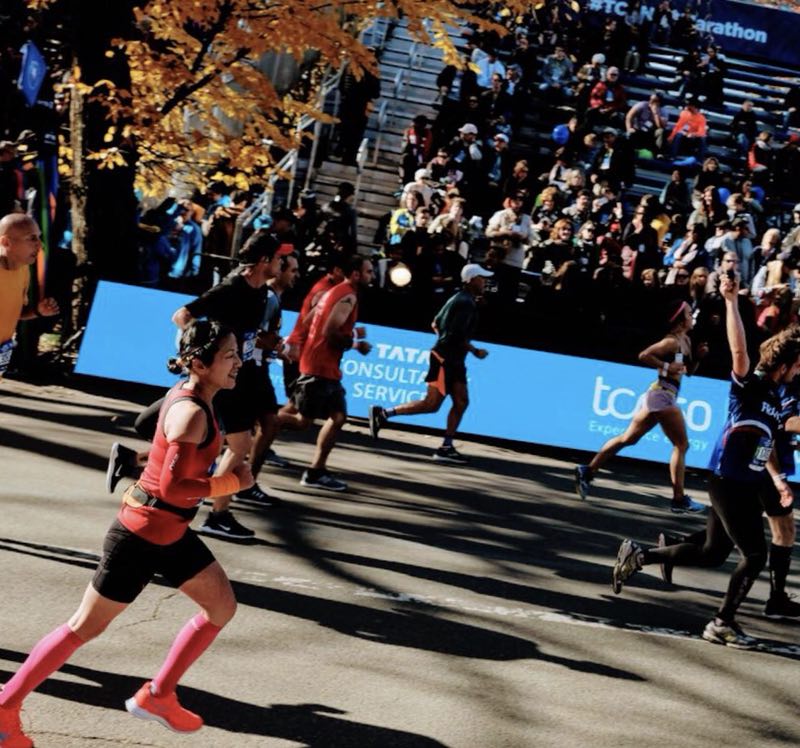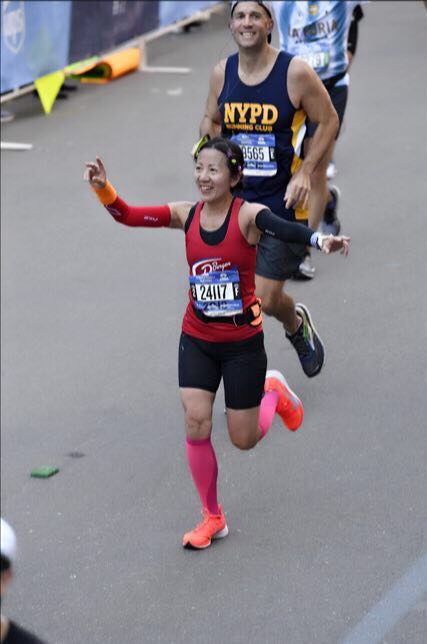New York City Marathon
Rachel Lu

I can run, but I could never run away from fate.
Twenty years ago, on a rainy Sunday afternoon, I had my first weekend visit to Manhattan. I had just landed a job downtown and settled in New Jersey, anxious about all the uncertainties. I emerged from the subway with the cloudy November sky overhead, my mood equally gloomy. That is, until I was met with a large uniform crowd, many of them covered by the same silvery rain poncho. With the rain drops bouncing off their shiny poncho and bursting into countless micro rainbows, all the faces shared a similar glow, even though they were each of a different color, age, and hairdo. Intrigued and lifted by the festive atmosphere, I asked one of the people, “What is going on?” “We just completed New York City Marathon,” he replied. As I was digesting the term “New York City Marathon” little did I know that that day I embarked on my voyage.
This year marks the twentieth year of my journey with New York City. I had thought about doing something to recap and reflect on the tears & laughs that I shared with this great city’s ups & downs for the last two decades. But what could I do. As though I was living in a great novel, fate foreshadowed my story a hundred pages ago on that Sunday afternoon when I first arrived in New York: in early spring, I won a rare New York Marathon entry in my running team’s lottery.
This race would be my third full marathon. While training for each race feels like the ultimate regeneration program, it takes hard work guided by relentless scientific discipline, proactive risk taking safeguarded by rigorous risk management, effective use of time, and support by my teams in different settings, family, and friends. Rewards are bountiful. Sharing laughs with running mates of different background especially when cracking jokes on bias which could have prevented us from even becoming friends was liberating. Opportunity to run alongside tens of thousands of people towards the same finish line while leaving our ideologies aside was priceless. The perpetual payoff is to contribute to my teams, family and friends thru my renewed energy and lessons learned from pain and sweat.
The New York Marathon on Sunday was the largest race I had ever participated in. The sheer number of runners and the enthusiasm from the cheering crowd was overwhelming at first, but by half way through the race, I was having fun. I took my time hitting high five with kids on sideway and stopping to hug my co-worker who stood in cold waiting for me. I was also scouting for my team captain Renny, who was in the race as well. Renny, a smashing beauty from Taiwan, built our running club from scratch and organized many training sessions and events. My training led me to the marathon and the opportunity to participate in this race was largely attributed to Renny’s efforts and leadership. As someone who was born on the mainland, I was taught either to hate her or to liberate her. Over a year of running together revealed that she needs neither. To all the ideologies that plotted to prevent me and Renny from running together, using one of the three English phrases I picked up from street, I only want to say “Scrxx them”. Obviously my runner’s high had started. Unfortunately, it seemed like it would be impossible for me to meet my finish time objective.
As I was passing by my running group water station at mile 14, one of my team members shouted at me: “Can you run faster? You can do better!” I waved and smiled at him, but thought to myself: “Faster? You’re kidding.” I had never had a race or long run where I ran faster in the second half than in the first half (a so called ”negative split”). On top of that, the New York Marathon course is notorious for the elevation from bridges and some long slopes in the second half. I could only project that I would add a few minutes to my best time. Then it occurred to me: This is New York. My city. My home turf. My supporting cast is watching me live, and all these people deserve my best. Forgetting about my training data and the elevation index, I just ran. After I passed the finish line, I saw my phone was flooded with texts. “PB, BQ2020…” “…this is insane…” “…”the largest negative split I have ever seen…” “…this is impossible…” “…you crushed the second half…” It turns out that I had run the second half faster than any of my half marathon races and the last 5K faster than my best 5K race.
I could not wait to share my immediate takeaway: past performance does not guarantee future performance. Don’t be limited by historical data. But later in the week, while reviewing some advanced machine learning concept driven methodologies introduced by my team, it struck me that it is not the data but the simple linear model I had in my head to project my pace almost cost my PR. Following the innovative and excellence –driven spirits of my team, I will update my algorithm for better prediction in Boston. I am hooked.
